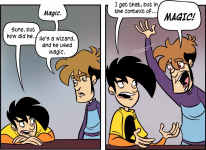MillieDynamite
Millie'sVastExpanse
- Joined
- Jun 5, 2021
- Posts
- 10,899
Why don't you write, and we'll all take turns telling you what is or isn't? 



In other words, if a story is set in an unnamed place and time that feels a lot like the Roman Empire mixed in with medieval times, but is otherwise completely recognizably human and this-world, is it still called Fantasy?
@StillStunned, maybe it's just called "Swords?" You, know. What's it called if there's no "Sorcery?" Is that your personal terminology, or is "Swords and Sorcery" a thing?
Edit: Mildly related trivia... How come such stories work in a swords-only setting? They don't work if there are guns in some imaginary world.

